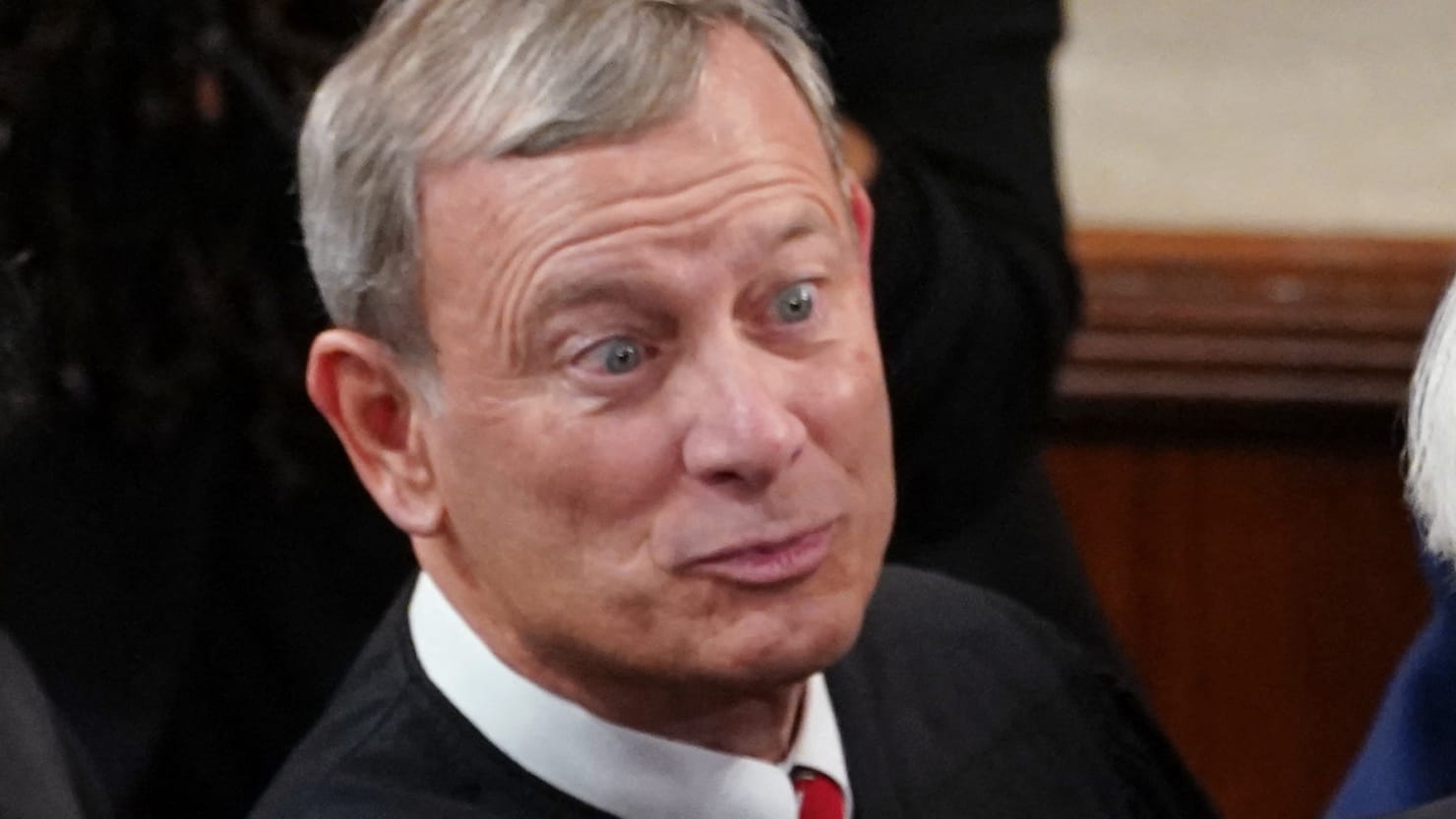- cross-posted to:
- politics@sh.itjust.works
- cross-posted to:
- politics@sh.itjust.works
The Supreme Court was hit by a flurry of damaging new leaks Sunday as a series of confidential memos written by the chief justice were revealed by The New York Times.
The court’s Chief Justice John Roberts was clear to his fellow justices in February: He wanted the court to take up a case weighing Donald Trump’s right to presidential immunity—and he seemed inclined to protect the former president.
“I think it likely that we will view the separation of powers analysis differently,” Roberts wrote to his Supreme Court peers, according to a private memo obtained by the *Times. *He was referencing the D.C. Circuit Court of Appeals’ decision to allow the case to move forward.
Roberts took an unusual level of involvement in this and other cases that ultimately benefited Trump, according to the Times— his handling of the cases surprised even some other justices on the high court, across ideological lines. As president, Trump appointed three of the members of its current conservative supermajority.



Lucky for us there is a system of checks and…oh wait…
Bribery. Checks and bribery.
A system of checks and money orders. And cash.
And luxury vacations. And forgiven “loans.” And property purchased as “gifts.” And free flights on private jets. And…
These fuckers. These absolutely amoral fuckers.
*immoral
Amoral, as in without morals.
Don’t forget the gold bars, and RVs
And cigarette cartons
Checks and bigger checks.
They may exchange goods and services for checks and bribery.
Bank checks and account balances.
A solid line you got there.
The biggest blunder of the framers was assuming we’d never form factions (i.e. parties). The assumption was that the branches would oppose each other, not collude.
I don’t think that’s their fault. They specifically addressed a two party system in multiple writings (they didn’t like it) in addition to explicitly stating that they expected future generations to update the constitution as necessary to protect the republic from those who would seek to undermine or replace it. We didn’t heed their warnings and now here we are.
To be clear, I don’t think the framers were infallible or able to see all possibile challenges that our nation would face. However, they seem to have been pretty damn good at learning from history and that’s something modern Americans are absolutely abysmal at. For all their faults they have a lot to teach us in that respect.
The problem with this is that it requires people in power to vote to limit their own power. And while there have been some, certainly, who have been willing to do so, getting a supermajority of people willing to do it is simply not something I see as remotely possible anymore.
It assumes a democracy of well informed voters that is capable of creating enough Cincinnatus figures that they can reliably voted in. That’s not the worst assumption for them to have. It’s a similar assumption to what fucked over the ussr and ccp. The problem is that the average person only cares about bread and circuses and that when the going gets rough or they start losing a certain percentage of the population is comfortable abandoning democracy for perceived security.
One could argue that situation would occur if we were smart enough to repeatedly elect those kinds people
At least one of them (maybe Jackson but I’m probably wrong on who) specifically warned about political parties
It was Washington. However, Washington also tended to side with Hamilton against Jefferson in practice, and those two would quickly form political parties that are the ancestors of the modern ones.
The “Founding Fathers” were far from a monolithic block of philosopher kings like American mythmaking likes to portray.
Duverger’s Law was developed in the 1950s and 60s, so it wasn’t understood way back then.
Thank you, good to know
Which is fucking stupid to think that humans won’t form tribes.
Yeah Andrew Jackson was not a founding father. He was a person who owned hundreds of human beings as slaves and conducted genocide against the native population. He was a total piece of shit really. Trump ordered Jackson’s portrait hung in the oval office during his presidency.
You think Trump knew him as anything but “the face on the $20 note”?
If he had gotten office in 1914, he’d have put Grover Cleveland’s portrait up for the same reason.
Trump knows Jackson, actually. Jackson is one of his favorite Presidents. Jackson was also a raging asshole, so that makes sense.
That Jackson portrait that was hung up during Trump’s tenure? They made sure it was there when Trump met with Native American leaders, and the intended insult was heard loud and clear.
You aren’t wrong on any count but it should be noted most of the founding fathers were slavers and conducted genocide on the native population. Jackson was just particularly shameless about both whereas someone like Jefferson was clearly uncomfortable with slavery, just not as much as he was with the idea of not keeping his fellow human beings, some of whom were his biological family, as slaves.
there is a system of cheques and account balances?